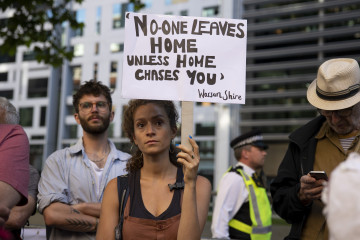

In 2012, the UK Home Office imposed the 'No Recourse for Public Funds' (NRPF) policy on immigrants in the process of legally settling in the UK, whilst also introducing a range of legislations that stripped away their rights.
Although many of these immigrants have a leave to remain in the UK, they are prevented from accessing a range of benefits such as income support, child tax credit, universal credit (UC) as well as housing benefits.
As documented migrants, they have permission to work and with a temporary permit to remain, immigrants need to renew their visas and have no right to welfare support for 10 years.
"With the NRPF policy in action, local food banks and charities in the UK are having to create an urgent 'welfare' umbrella to support those facing untold strife on British soil"
In Newham, one of the most deprived boroughs in London, more than 49.5% of children live below the poverty line and local food banks and charities are facing enormous pressure under COVID-19 lockdowns to support low-income families under immigration controls.
The UK’s anti-poverty campaigners have warned that the policy will have an enormously negative impact on these communities.
"The No Recourse to Public Funds (NRPF) policy in the UK is having a hugely detrimental impact on migrants and migrated communities.," said Fizza Qureshi, CEO of the Migrants' Rights Network.
"Limiting an individual's access to housing and welfare support when they desperately need it is heartless. At the Migrants’ Rights Network, we’ve seen the terrible effect of these policies on people. With the ongoing impact of COVID-19 and the looming ‘cost of living crisis, there must be an end to the cruel NRPF policy," Fizza told The New Arab.
In May 2020, Labour MP Stephen Timms questioned the former prime minister Boris Johnson about the NRPF, mentioning the case of the family from Newham, which has been MP Timms’ constituency for the last 25 years.
Both parents were from Pakistan with a leave to remain in the UK and had worked for years in the country. When the father lost his job during the pandemic, the NRPF status left the family struggling to pay their rent.
Surprisingly, Johnson appeared not to have heard about the NRPF policy and he said the family should apply for Universal Credit (UC). This state benefit is paid every month to low-income families and those out of work to help them to cover their living costs.
MP Timms, Chair of the Work and Pensions Committee, said: “Boris Johnson was surprised when I asked him about NRPF. Typically, when a family gets leave to remain in the UK, it’s for two and a half years, and a No Recourse to Public Funds condition is attached.
"These families will often previously have had a student visa, and have children born here. They have to renew their leave every two and a half years until they have had temporary leave to remain for ten years."
Stephen continued: "They can then apply for indefinite leave to remain, and, when they get that, they gain access to social security. My Work and Pensions Committee recently recommended that, for families with children, the ten-year maximum period with No Recourse to Public Funds should be reduced to five. Children who are in the UK for over five years while growing up are generally here permanently. It is therefore in the country’s interests for them to be supported to reach their maximum potential, alongside other children.”
Sonita Gale is a BAFTA-longlisted filmmaker of Hostile, an award-winning documentary movie that put the light on the unfair treatment of immigrants in the UK.
Her movie is a true fight for getting the welfare state rights for those under immigration control and abandoning the unfair government policy that often leaves the most vulnerable in despair and without the state’s support.
Sonita’s documentary movie brutally and in-depth explores the lives of international students’ members of the Windrush generation and even so-called highly-skilled migrants that are also affected by the NRPF policy.
“The political situation in the UK is currently in flux, but for the past few years, the Home Office has been very strict in the way it manages the arrival of migrants," she says.
"As Hostile touches upon, the situation now is very different from when my parents arrived in the country in the ‘50s and ‘60s. For migrants who come here on a leave to remain visa, there is a lot more emphasis on targets – such as whether people with the right skills are being admitted into the country, and whether they can meet income thresholds for example," Sonita tells The New Arab.
"Their economic worth needs to be determined before they enter the country. Added to this, once they are here, there is a system of surveillance and checks in place which keeps them on a tighter leash."
With the NRPF policy in action, local food banks and charities in the UK are having to create an urgent “welfare” umbrella to support those facing untold strife on British soil.
As the film Hostile remarks, the NRPF policy towards immigrants is not British, it’s brutish.
Karolina Króliczek is a local reporter for Newham Voices, a local community newspaper based in East London. She is also the founder of PR Insight, the first bilingual Polish PR/Digital PR agency based in London.
Follow her on Twitter: @KroliczekK
![East London, with a high number of migrant communities, has been placed under undue stress by Home Office policies [Getty Images]](/sites/default/files/styles/medium_16_9/public/2022-09/GettyImages-1242659487.jpg?h=bfe0b221&itok=fkohn6XC)




 Follow the Middle East's top stories in English at The New Arab on Google News
Follow the Middle East's top stories in English at The New Arab on Google News


